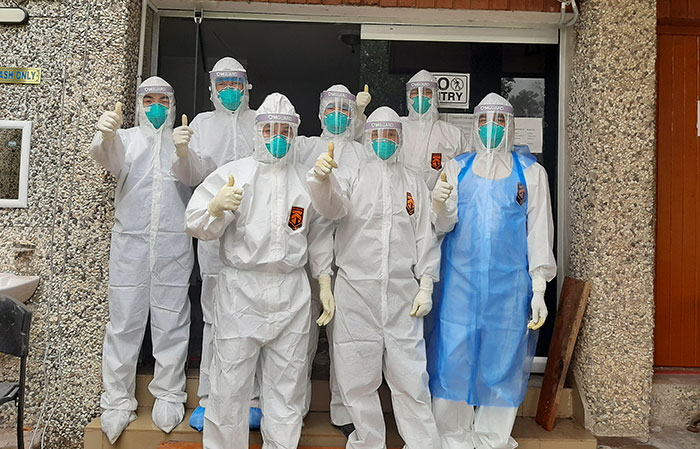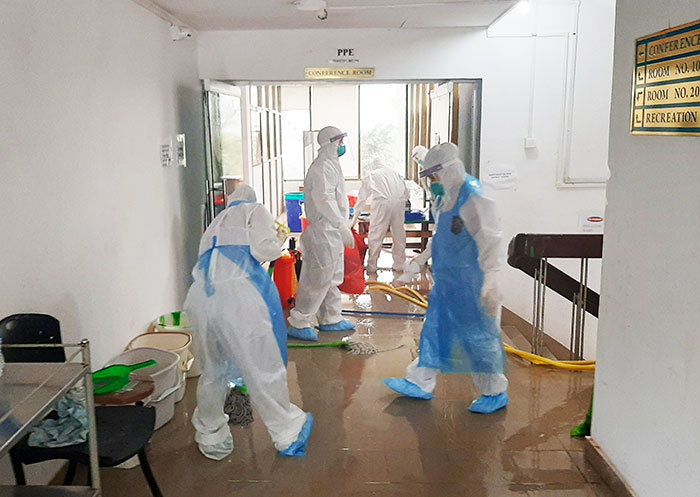Rajesh Rai | Phuentsholing
Phuentsholing, the town considered a red zone and still graded a high-risk area, had no Covid-19 positive patient for the last four days.
The last patient left the RIGSS Covid-19 hospital, which caters to the Covid-19 patients, on January 13. She has been placed in de-isolation.
First time since August 12, 2020 the hospital has no patients. The first Covid-19 positive case in the bordering town was reported on June 28 last year. After de-isolating her, the next patient was admitted on August 12. Since then, the RIGSS hospital has catered to 179 patients.
Of the total, four were transferred to India, and one had absconded across the border.
To mark the occasion, health workers at the hospital conducted a mass-cleaning of the RIGSS hospital.
Doctor Gemba Wangchen said that he was “very proud and relaxed” after a long time.
“We all have achieved this together,” he said, adding that the feat was a result of collective team effort since the day one.
“I wish there is no more cases here in Phuentsholing.”
The doctor said it wouldn’t have been possible without the guidance from His Majesty The King, the government, the different stakeholders and the residents.
“We all fought this together.”
Another health worker said it was really hard and challenging initially to prepare the health workers and the community on Covid-19 awareness and infection prevention.
“But with time, people became more aware,” he said. However, at the same time some also become complacent, he added.
Although the vaccine may arrive soon, health officials said that residents have to embrace the new culture of practising Covid-19 safety protocols at all times.
“Our people should use face masks, hand-washing, sanitising, and maintain social distancing.”

Sanitised: Health workers at the RIGSS hospital
Many attribute the second nation-wide lockdown, which impacted the import of foreign workers, as the main reason for the drop in Covid-19 cases.
Usually, more than 400 foreign workers entered Phuentsholing each month starting on October 1. These labourers headed to places across the country were quarantined in Phuentsholing.
Although foreign workers have to produce Covid-19 clearance certificate, many still tested positive in quarantine facilities in Phuentsholing.
Between October 1 and January 16, a total of 2,376 foreign workers entered the country. Of that, a total of 1,363 entered through Phuentsholing.
The import of labourers at present has drastically reduced. Initially, 50 foreign workers were allowed to enter every day, but the permissible limit is 30 these days.
After the first positive case was reported in the country on March 6, 2020, the government sealed the international borders to curb the risks of infection.
Given the porous border and the busiest trading town, Phuentsholing was considered a high-risk area since the beginning. Hundreds of patrol teams of De-Suups, police and other volunteers have been placed along the border areas to monitor the illegal movement of people.
Currently, there are more than 800 De-Suups in Phuentsholing and on average, about 400 de-suups are on duty every day.
A resident said that those in Phuentsholing were also more cautious which could be why there was no local transmission.
“People here are scared because the transmission was higher during the first lockdown and they complied with safety protocols. But it is nothing to be proud of,” he said. “There is much to do and it’s only a matter of time before we see another local transmission.”
After the second lockdown was lifted, Phuentsholing has also seen more control measures put in place. All the shops are now required to have wash basins, hand sanitiser, and keep record of customers through registration or Druk Trace app.
“We have also signed an undertaking stating that we will abide by all the safety protocols to prevent Covid-19,” a shopkeeper said. “This is a very good way to start after the second lockdown.”
Although the mini dry port (MDP) was considered a risky zone, proper protocols have helped and not a single positive case has been reported after the first nationwide lockdown.
Export of boulders and oranges, despite considered risky business activity, have not reported Covid-19 transmission. These business activities are cautiously operated in self-containment mode.
“It is mainly because people have learned a lesson,” a boulder exporter said, adding there is also proper checks and balances.
Boulder suppliers and exporters have also signed undertakings to abide by the Covid-19 protocols, which if compromised, they will be penalised under Section 410 and 448 of the Penal Code of Bhutan.


